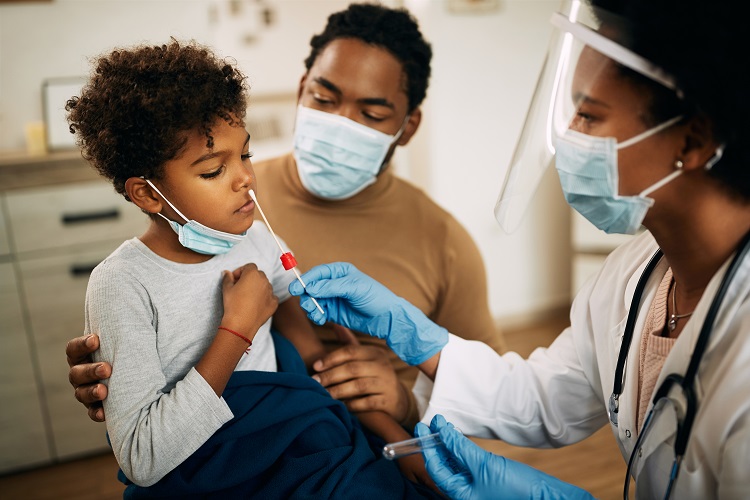
VCU School of Nursing joins NIH-funded national study on long-term effects of COVID-19 in children
Families can learn more about the project and participate at VCU, one of several study sites in the U.S.
September 15, 2021
The National Institutes of Health announced Wednesday the expansion of a national research project dedicated to studying the long-term health impacts of COVID-19. Researchers from Virginia Commonwealth University are joining a team of scientists to study the impact of Long COVID-19, specifically in infants, children and adolescents.
With more than 30% of new COVID-19 cases occurring in children, understanding the long-term impact of this illness on their health, development and well-being is critical. A team of interdisciplinary researchers at the VCU School of Nursing, Rhode Island’s Hasbro Children’s Hospital, NYU Langone Health, Northeastern University and the Translational Genomics Research Institute will play an integral role in the recently announced $470 million NIH Researching COVID to Enhance Recovery (RECOVER) Initiative.
COVID-19 has potential long-term consequences on children’s ability to learn and play, but those impacts are poorly understood. Centers for Disease Control and Prevention data show pediatric cases of COVID-19 rose in the U.S. this summer. As of Sept. 15, Virginia is approaching 1,000 hospitalizations of Virginians, ages 1-19, according to demographic figures from the Virginia Department of Health.
As part of this nationwide study, VCU School of Nursing researchers will lead one of three sites recruiting participants for the new Life-Course Examination of General Affect and Neurocognitive Changes Following COVID-19 Infection (LEGACI) study consortium, with a specific focus on individuals under age 25.
Amy Salisbury, Ph.D., professor and associate dean of research, scholarship and innovation at VCU School of Nursing, and Patricia Kinser, Ph.D., endowed professor in the Department of Family and Community Health Nursing and assistant dean for research at VCU School of Nursing, will co-lead VCU’s site for this study.
Salisbury and Kinser are joining colleagues from several institutions: Sean Deoni, Ph.D., from Rhode Island’s Hasbro Children’s Hospital and the Warren Alpert Medical School of Brown University, Moriah Thomason, Ph.D., at NYU Langone Health, Laurel Gabard-Durnam, Ph.D., at Northeastern University and Matt Huentelman, Ph.D., at Arizona’s Translational Genomics Research Institute (TGen).
“This study is pivotal to understanding the long-term effects of COVID-19 on children,” Salisbury said.
Several hundred participants will be involved, recruited from Richmond and the surrounding area.
“We will work diligently to engage the community,” Kinser said. “Our research teams will be working out in the community, to make it easy for families to participate.”
“While children appear to be resilient against COVID-19 and are much less likely to have severe illness or death, we don’t know how COVID-19 affects their long-term health and development, and it’s something we need to answer quickly,” Deoni said.
Preliminary work from Thomason’s group at NYU Langone suggests that up to 14% of children who had COVID-19 continue to suffer from lingering symptoms.
“We need to understand what children infected with COVID-19 are experiencing and need to identify factors that predict better or worse outcomes,” Thomason said. “These help us to develop better ways to care for and counsel families.”
The most common symptoms include pain, headaches, fatigue, “brain fog,” shortness of breath, anxiety, depression, fever, chronic cough and sleep problems. These symptoms can impact a child’s ability to perform at school or participate in everyday activities and sports.
While COVID-19 has affected almost every family, “we have learned that families identifying as American Indian, Hispanic or Latino, and Black or African American have been particularly affected,” Salisbury said.
“Unfortunately, these are also families that have traditionally not been represented in research,” Kinser said.
To address this, the team will use a series of mobile laboratories, complete with neuroimaging facilities, to bring the research to involved families.
“Families want to participate in this research, but they often are unable to take time away from work, school, or other responsibilities to come into a hospital or university research lab,” said Huentelman, an expert in population genomics who has built a nationwide virtual study cohort using online testing and social media.
In addition, “we will build local networks of people affected by long COVID and representatives from advocacy organizations to help build links to affected families and communities, and to quickly disseminate information back to them,” said Gabard-Durnam of Northeastern.
Together with the larger RECOVER initiative, the LEGACI study will add to the unique multidisciplinary research community, inclusive of diverse research participants that are critical to informing the treatment and prevention of the long-term effects of COVID-19. Specifically, the LEGACI study will:
- Enroll children and their parents during and after SARS-CoV-2 infection;
- Use mobile health technologies, such as smartphone apps and wearable devices, which will gather real-world data in real time;
- Characterize the incidence and prevalence of long-term effects from SARS-CoV-2 infection in infants, children and adolescents, including the range of symptoms, underlying causes, risk factors, and outcomes;
- Address potential strategies for treatment and prevention.
“This is an important opportunity to answer important questions about the impact of COVID-19 infection and Long COVID illness in children, and we will need everyone’s help,” Deoni said. “Effects of COVID could have lifelong impact, so it is important to understand these effects and identify potential opportunities to minimize them.”



